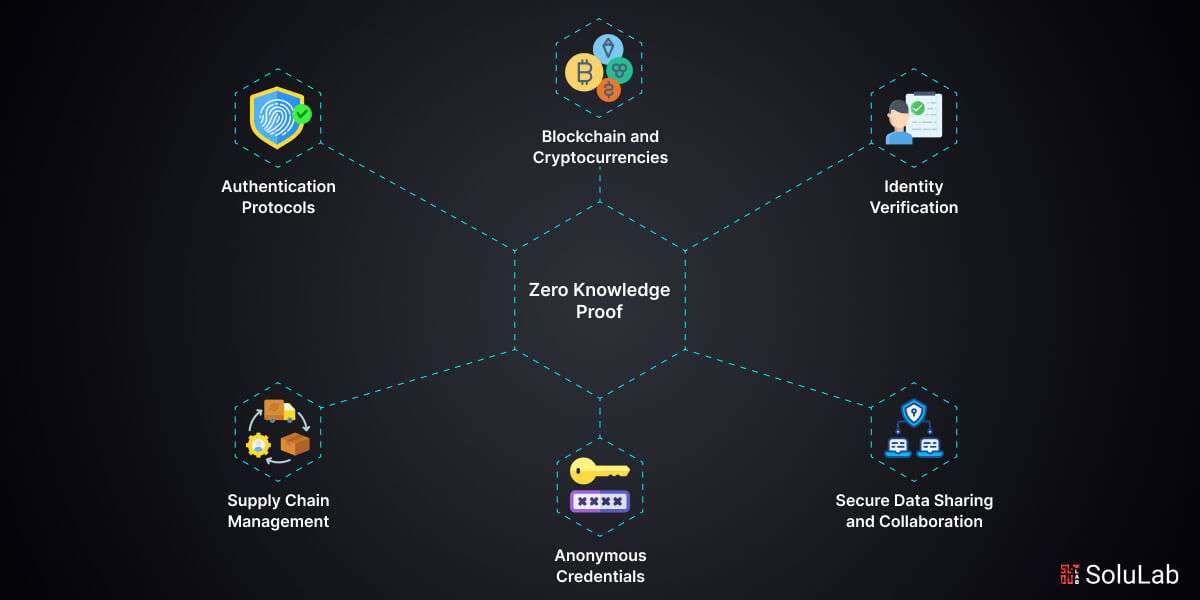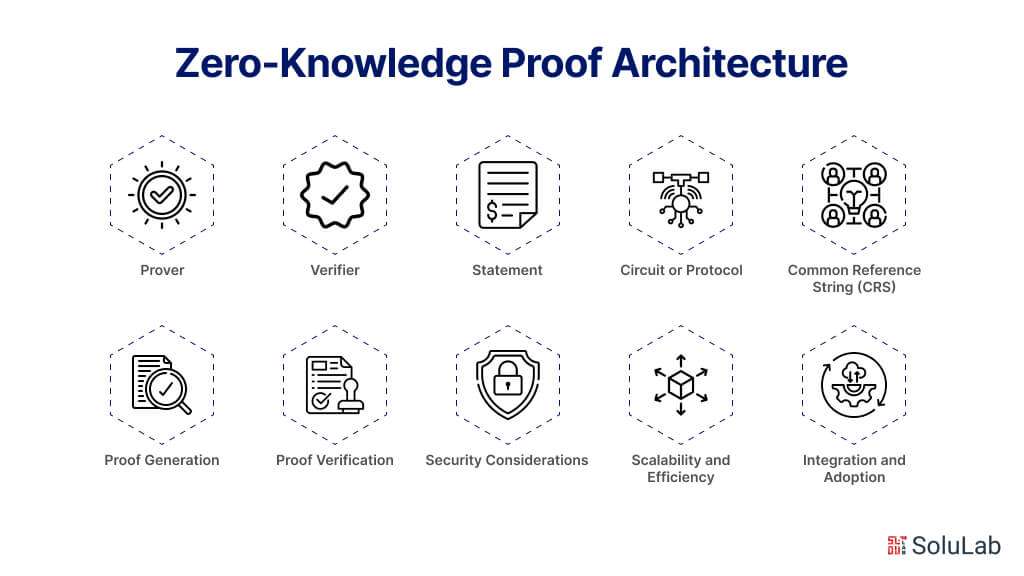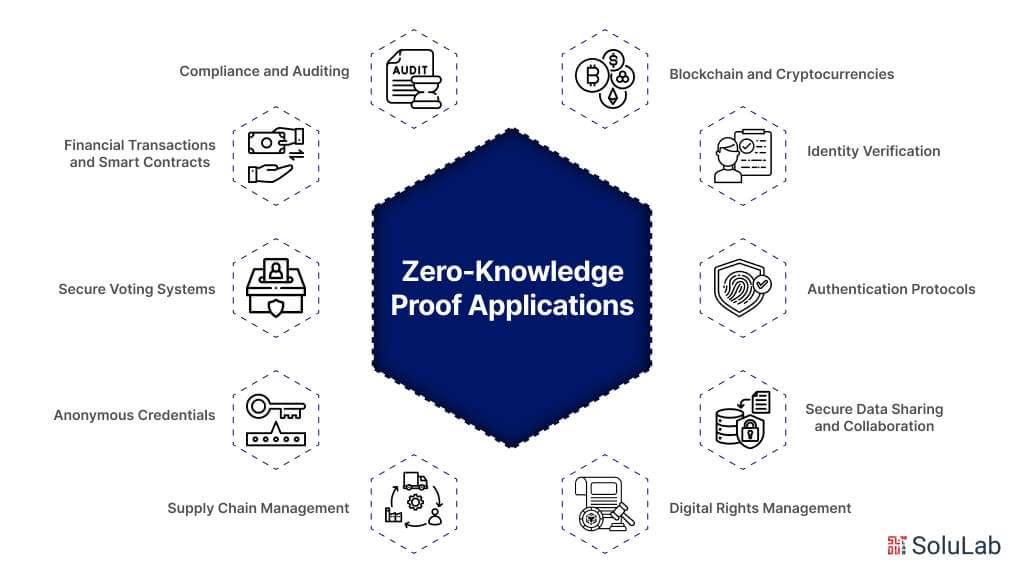
From online banking to blockchain transactions, users want proof that systems are secure, without revealing sensitive information. That’s where Zero-Knowledge Proofs (ZKPs) come in.
However, you need to prove you know a password or hold a valid ID without actually showing it. Traditional systems require you to reveal your data, which increases the risk of breaches. ZKPs solve this by allowing you to prove something is true, without revealing the actual data behind it. Used in everything from cryptocurrencies to identity verification, ZKPs are changing how we handle privacy.
In this blog, we’ll break down how ZKPs work and explore their real-world applications across various industries. If privacy matters to you, this is technology you’ll want to understand.
What is Zero-Knowledge Proof?
A Zero-Knowledge Proof (ZKP) is a cryptographic method that allows one party (the prover) to prove to another party (the verifier) that they know a value or secret, without revealing any information about the secret itself.
In simpler terms, it’s like proving you know the answer to a puzzle without showing how you solved it. This concept is widely used in blockchain and privacy-focused applications to ensure data validation without exposing sensitive details.
The following three characteristics are intrinsic to ZKPs:
-
Completeness
The transaction is validated, and the prover is allowed to conduct the transaction ahead of time, according to the completeness property. The person who verifies has the power to give the prover the input he previously sought while the transaction statement is accurate.
-
Reliability
The transaction is accurate and does not relate to any fraudulent cases, according to the soundness property. It implies that the verifier cannot be persuaded in any scenario if the transaction circumstances differ and the assertion is false. The verifier is unable to approve the prover’s request for the inputs in this case or certify the prover.
-
Zero-Knowledge
Other than the present statement and whether or not it is real, the verifier is only allowed access to that information. Private information belonging to other parties shall remain concealed.
Zero-Knowledge Proof Architecture

Zero-knowledge proof (ZKP) architecture encompasses the underlying structure, protocols, and components that enable the implementation of zero-knowledge proofs in various applications. The architecture typically consists of several key elements designed to facilitate secure and efficient interactions while preserving privacy and confidentiality. Here’s an overview of the components and considerations within Zero Knowledge architecture:
- Prover: The prover is the entity that wishes to prove the validity of a statement or claim to a verifier without revealing any additional information beyond the truth of the statement. The prover constructs and executes the zero-knowledge proof protocol to convince the verifier of the statement’s validity.
- Verifier: The verifier is the entity that seeks to verify the validity of the statement presented by the prover without gaining any knowledge beyond the statement’s truth. The verifier interacts with the prover during the zero-knowledge proof protocol to validate the statement while maintaining privacy and confidentiality.
- Statement: The statement is the assertion or claim that the prover seeks to prove to the verifier. This could be anything from the correctness of a cryptographic transaction to the possession of certain credentials or attributes. The statement must be formulated in a way that allows for efficient and secure verification using zero-knowledge proofs.
- Circuit or Protocol: The circuit or protocol represents the computational process or algorithm used to encode the statement and generate the zero-knowledge proof. This could involve cryptographic primitives such as hash functions, encryption schemes, or commitment schemes, as well as specific zero-knowledge proof protocols like zk-SNARKs (Zero-Knowledge Succinct Non-Interactive Argument of Knowledge) or zk-STARKs (Zero-Knowledge Scalable Transparent Arguments of Knowledge).
- Common Reference String (CRS): In some zero-knowledge proof systems, a common reference string is generated and shared between the prover and verifier to facilitate the proof generation and verification process. The CRS typically contains random parameters used in the proof generation and is assumed to be generated honestly by a trusted party.
- Proof Generation: The prover generates the zero-knowledge proof using the statement, circuit, protocol, and possibly the common reference string. The proof generation process involves executing cryptographic computations to create a succinct and convincing proof that the statement is true, without revealing any additional information about the statement itself.
- Proof Verification: The verifier verifies the zero-knowledge proof provided by the prover to determine the validity of the statement. The verification process involves executing cryptographic checks to ensure that the proof is valid and corresponds to a truthful statement. If the verification is successful, the verifier accepts the proof without gaining any knowledge beyond the statement’s truth.
- Security Considerations: ZKP architecture includes various security considerations to ensure the confidentiality, integrity, and authenticity of the zero-knowledge-proof system. This involves analyzing potential attack vectors, ensuring cryptographic primitives are secure, and implementing measures to prevent adversaries from compromising the proof generation or verification process.
- Scalability and Efficiency: ZKP architecture addresses scalability and efficiency concerns to enable practical implementation in real-world applications. This includes optimizing proof generation and verification algorithms, minimizing computational and communication overhead, and exploring techniques for batch processing or parallelization to handle large volumes of transactions or interactions.
- Integration and Adoption: ZKP architecture considers the integration of zero-knowledge proofs into existing systems and applications, as well as strategies for promoting adoption and usability. This involves providing developer-friendly tools and libraries, establishing standards and best practices, and educating stakeholders about the benefits and implications of zero-knowledge-proof technology.
Overall, zero-knowledge-proof architecture provides a framework for designing, implementing, and deploying secure and privacy-preserving systems and applications across various domains. By leveraging cryptographic techniques and protocols, ZKP architecture enables efficient and trustworthy interactions while safeguarding sensitive information and preserving individual privacy rights.
What are the Different Blockchain Use Cases of Zero-Knowledge Proof?
Zero-knowledge proofs (ZKPs) are cryptographic protocols that enable one party (the prover) to prove to another party (the verifier) that a statement is true without revealing any information beyond the validity of the statement itself. This concept has numerous applications across various domains due to its ability to enhance privacy, security, and efficiency.
Zero-knowledge proofs improve security, safeguard user privacy, enable scaling with layer 2s, and open up intriguing use cases across Web3. Here are some notable use cases of zero-knowledge proofs based on blockchain:
-
Private Transactions on Blockchain
ZKPs allow users to verify transactions without revealing the sender, receiver, or amount. This is especially useful in privacy-focused cryptocurrencies like Zcash, and increasingly in Ethereum-based zk-rollups. Users can maintain confidentiality without sacrificing decentralization or trust.
-
Scalability Solutions (ZK-Rollups)
ZKPs are at the core of zk-rollups, a Layer 2 scaling solution that batches multiple transactions off-chain and proves their validity with a single proof on-chain. This drastically reduces gas fees and increases transaction throughput, making Ethereum and similar networks faster and more efficient.
-
Decentralized Identity Verification (DID)
With Zero-Knowledge Proofs, users can prove aspects of their identity—like age, citizenship, or credentials—without revealing sensitive personal data. This makes ZKPs ideal for building decentralized, privacy-preserving identity systems useful in Web3 logins, KYC, and access control.
-
Secure Authentication & Passwordless Login
ZKPs can be used to prove you know a password or key without ever revealing it, enabling secure, privacy-first authentication. This reduces the risk of data breaches, phishing attacks, and identity theft—perfect for both enterprise and consumer applications.
-
Regulatory Compliance (Without Data Exposure)
ZKPs enable platforms to prove compliance with laws such as AML/KYC, GDPR, or financial regulations, without sharing user data. This is crucial for institutions that want to enter decentralized finance (DeFi) or Web3 without violating privacy mandates.
Benefits of Zero Knowledge Proof
Zero-knowledge proofs (ZKPs) offer a multitude of benefits across various domains, revolutionizing the way information is shared, transactions are conducted, and privacy is upheld. Here are some key benefits of zero-knowledge proofs:
- Enhanced Privacy: One of the most significant benefits of ZKPs is their ability to enable transactions and interactions without revealing unnecessary information. Users can prove the validity of a statement or transaction without disclosing any additional data beyond what is required, thus preserving their privacy and confidentiality.
- Improved Security: ZKPs contribute to enhancing security by reducing the risk of sensitive information exposure. Since only the necessary information is disclosed to verify a statement, the likelihood of data breaches or unauthorized access is minimized. This is particularly valuable in systems where privacy and security are paramount, such as blockchain networks and zero-knowledge authentication protocols.
- Efficiency: ZKPs can streamline processes by eliminating the need for extensive data exchange and verification. Since only the validity of a statement needs to be proven, unnecessary back-and-forth communication or data transmission can be avoided, leading to faster and more efficient transactions.
- Trust and Transparency: Zero-knowledge proofs promote trust and transparency among parties involved in transactions or interactions. By providing cryptographic assurances without revealing sensitive information, ZKPs enable parties to verify the integrity of statements or transactions, fostering trust in digital systems and reducing the need for intermediaries.
- Scalability: Zero-knowledge proofs offer scalability benefits, particularly in blockchain and decentralized systems. By enabling efficient verification of transactions or smart contracts without requiring full data disclosure, ZKPs can alleviate scalability challenges associated with processing large volumes of data on decentralized networks.
Powerful Applications of Zero-Knowledge Proofs

Zero-knowledge proofs (ZKPs) have a wide range of applications across various industries, offering solutions to challenges related to privacy, security, and efficiency. Here are some notable applications of zero-knowledge proofs:
-
Blockchain and Cryptocurrencies
ZKPs play a crucial role in enhancing privacy and confidentiality in blockchain development. Cryptocurrencies like Zcash and Monero leverage ZKPs to enable private transactions, where the sender, receiver, and transaction amount remain confidential while still ensuring transaction validity and integrity.
-
Identity Verification
ZKPs are used in identity verification processes to prove certain attributes or credentials without revealing unnecessary personal information. This can be applied in scenarios such as age verification, citizenship authentication, and access control systems, where privacy regulations and user confidentiality are paramount.
-
Authentication Protocols
Zero-knowledge proofs enhance authentication mechanisms by allowing users to prove their identity without disclosing sensitive information such as passwords or biometric data. ZKPs enable secure and privacy-preserving authentication protocols, reducing the risk of identity theft and unauthorized access to digital services.
-
Secure Data Sharing and Collaboration
ZKPs facilitate secure data sharing and collaboration among multiple parties while preserving confidentiality and privacy. In fields like healthcare and research, zero-knowledge proofs enable stakeholders to analyze sensitive data without accessing individual records, ensuring compliance with privacy regulations and protecting patient confidentiality.
-
Supply Chain Management
Zero-knowledge proofs are used in supply chain management to verify the authenticity and integrity of products or transactions without revealing proprietary information. ZKPs enable transparent and trustless supply chains, allowing stakeholders to track and verify the provenance of goods while protecting sensitive business data.
-
Anonymous Credentials
ZKPs enable the issuance and verification of anonymous credentials, where users can prove certain attributes without disclosing their actual identity. This can be applied in voting systems, access control mechanisms, and online services to ensure anonymity and privacy while still verifying user credentials.
-
Secure Voting Systems
ZKPs enhance the security and integrity of voting systems by enabling voters to prove the validity of their votes without revealing their choices. Zero-knowledge proofs ensure anonymity, prevent vote tampering, and enhance trust in electoral processes, making voting systems more secure and reliable.
-
Financial Transactions and Smart Contracts
Zero-knowledge proofs are utilized in financial transactions and smart contracts to enhance privacy and security. By leveraging ZKPs, parties can verify transactions or contract conditions without disclosing sensitive financial details, ensuring confidentiality and integrity in decentralized financial systems.
-
Digital Rights Management
ZKPs can be applied in digital rights management systems to protect intellectual property and prevent unauthorized access to copyrighted content. Zero-knowledge proofs enable content owners to prove ownership or entitlement to access rights without exposing sensitive information, reducing the risk of piracy and unauthorized distribution.
-
Compliance and Auditing
Zero-knowledge proofs facilitate compliance and auditing processes by enabling verifiable and transparent record-keeping without revealing sensitive data. ZKPs allow organizations to demonstrate compliance with regulations and standards while protecting confidential information from unauthorized access or disclosure.
Future of Zero-Knowledge Proofs Beyond 2025
ZKPs are expected to play a key role in scaling blockchain networks by enabling faster and more private transactions. With the rise of decentralized finance (DeFi) and Web3, ZKPs offer a way to prove user identity, transaction validity, or ownership without exposing sensitive data.
Industries like healthcare, finance, and supply chain are also exploring ZKPs to ensure compliance without compromising user privacy. Moreover, advancements like zk-rollups are already helping reduce congestion on Ethereum by processing multiple transactions off-chain and verifying them with a single proof.
As technology grows, ZKPs will likely become standard in digital authentication, enabling secure voting systems, digital IDs, and private smart contracts. Overall, ZKPs are changing how trust is established in a privacy-first digital world, making them a core part of future secure systems.
Conclusion
Zero-Knowledge Proofs (ZKPs) are changing how we share and verify sensitive information without compromising privacy. From secure logins and identity verification to blockchain transactions and confidential data sharing, ZKPs offer a powerful solution for trustless interactions.
Their ability to validate information without revealing the actual data makes them ideal for industries like finance, healthcare, and cybersecurity. ZKPs are becoming essential in building secure, scalable, and privacy-preserving systems. Solulab, as a leading blockchain developemnt company, offers all kinds of services backed by years of experience and expertise.
Whether in Web3, digital ID, or compliance processes, the use of Zero-Knowledge Proofs is only expected to grow in the years ahead. Want to integrate in your business, contact us today!
FAQs
1. Are ZKPs ready for mass adoption in 2025?
Yes, many ZKP frameworks and toolkits are now production-ready, and major Layer-2 solutions like zkSync, Polygon zkEVM, and StarkNet are already using them at scale. With increasing demand for data privacy, regulatory compliance, and user control, ZKPs are moving from experimental to essential across the blockchain ecosystem.
2. Are Zero-Knowledge Proofs only for blockchain applications?
No. While ZKPs are heavily used in blockchain, their applications go far beyond. They’re being used in secure authentication, data privacy compliance (like GDPR), digital voting, cloud data sharing, and zero-trust enterprise security models. Their ability to enable trust without disclosure makes them useful in both centralized and decentralized systems.
3. What industries are adopting Zero-Knowledge Proofs in 2025?
In 2025, ZKPs are being adopted across multiple sectors including fintech, supply chain management, healthcare, cybersecurity, government, and e-voting systems. Any industry that deals with sensitive data or requires verification without data exposure can benefit from ZKP-based solutions.
4. Can traditional companies integrate ZKPs without being fully decentralized?
Yes. ZKPs are not limited to decentralized systems—they can be integrated into traditional (centralized) infrastructures to improve data privacy, user verification, and internal compliance checks. Banks, healthcare firms, and supply chain companies are already exploring ZKP use without going fully Web3.
5. What does the future of ZKP adoption look like?
The future of Zero-Knowledge Proofs is promising. As privacy regulations grow stricter and decentralized systems become more mainstream, ZKPs will be essential for building secure, scalable, and compliant applications across industries. They’re expected to be a standard component in Web3, AI systems, IoT security, and even real-world identity frameworks.






